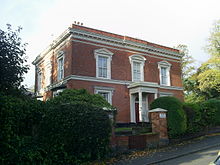- Constance Naden
-
Constance Caroline Woodhill Naden (24 January 1858 – 23 December 1889) was an English poet and philosopher.
Born at 15 Francis Road, Edgbaston, Birmingham, England to Thomas Naden, an architect, later president of the Birmingham Architectural Association, and Caroline Ann who died within two weeks of giving birth. She was brought up by her mother's parents at Pakenham House, Edgbaston, who were devout baptists and well read.
At age 8 she was sent to a local Unitarian day school, where she developed a talent for painting. When she left school at 16 she submitted some paintings to the Birmingham Society of Artists but they were rejected. She then turned her interests to philosophy, languages and the sciences, in 1879 attending the Birmingham and Midland Institute to study botany, and in 1881 published her first volume of poetry Songs and sonnets of Springtime and attended courses in science at Mason Science College, also becoming a member of the Birmingham Natural History Society. Through this period she began an interest in social Darwinism, inspired by the writings of Herbert Spencer which was later to influence her writing.
In 1887 she published a second volume of poetry A modern apostle and inherited a considerable fortune from her grandmother which allowed her to travel to Constantinople (Istanbul), Palestine, India, and Egypt. She returned to England in June 1888, becoming part of the London scientific community, and gaining attention as an essay writer, one of which, Induction and deduction won her the Heslop Gold Medal. At the age of 31 she died as the result of an operation, in 1889. She was lauded after her death for both her philosophical writings, by Dr. Robert Lewins and for her poetry in an article by the Liberal MP William Ewart Gladstone (three times prime minister) in the Spectator (11 January 1890), in which he ranked her among the top eight women poets of the nineteenth century. Two books were published posthumously, Induction and deduction, and other essays (1890), and The complete poetical works of Constance Naden (1894). Herbert Spencer, the inspiration for much of her writing remarked that "she had philosophical capacity comparable with that of George Eliot".
She was buried at Key Hill Cemetery, Hockley, Birmingham (Section P, Grave No 460), but sadly no headstone survives.
After her death, R. H. Lewins, MD founded the Constance Naden Medal in her honour, given for the best competitive philosophical essay each year. The medal is awarded annually for the best thesis accepted by the University of Birmingham for the MA degree in the Faculty of Arts.
Lewins also commissioned a bust of Constance which he presented to Mason's College and which is now sited in the University of Birmingham in Edgbaston Park Road.
On 14 December 2009, The Birmingham Civic Society provided a commemorative blue plaque which was unveiled by the Lord Mayor. The inscription reads "CONSTANCE C.W.NADEN 1858-1889 Poet, Scientist and Philosopher lived here for most of her life"
References
- "Naden, Constance Caroline Woodhill" British Authors of the Nineteenth Century H.C Wilson Company, New York, 1936.
- Stephen, Leslie. "Naden, Constance Caroline Woodhill" Dictionary of National Biography. London: Smith, Elder, & Co, 1885.
External links
Categories:- 1858 births
- 1889 deaths
- English philosophers
- English poets
- English women writers
- Women of the Victorian era
- People from Birmingham, West Midlands
- Women poets
- People from Edgbaston
Wikimedia Foundation. 2010.


